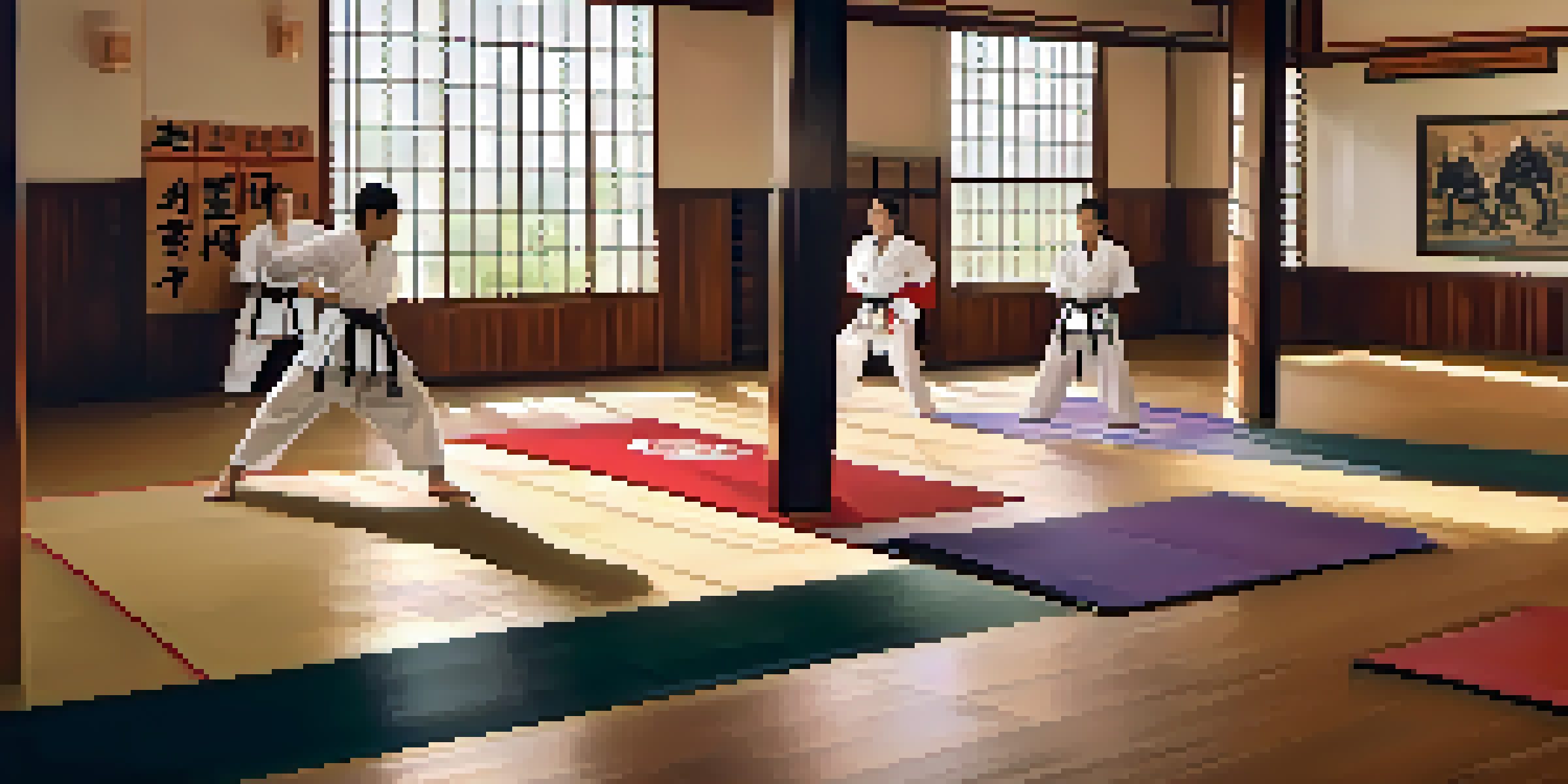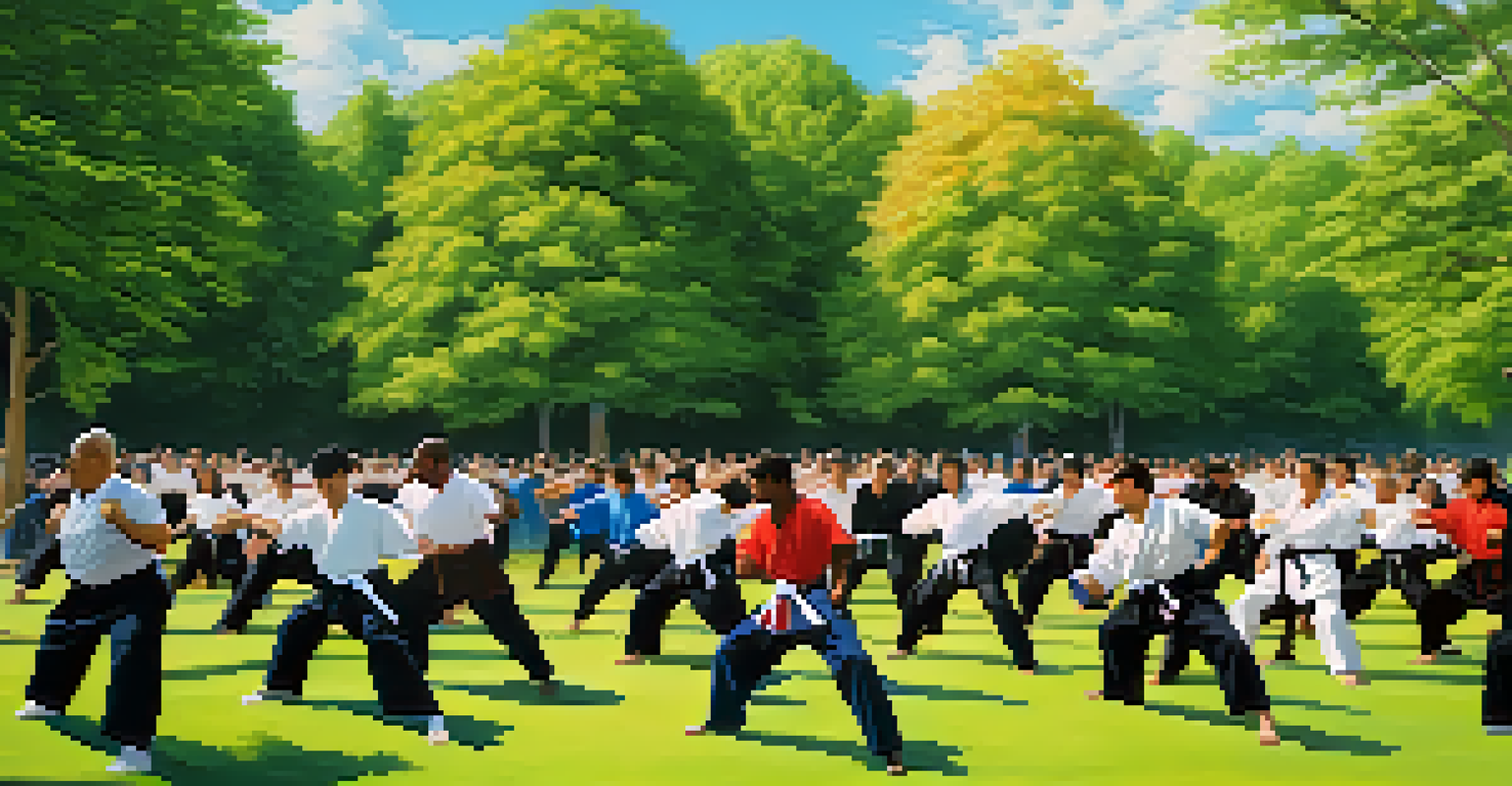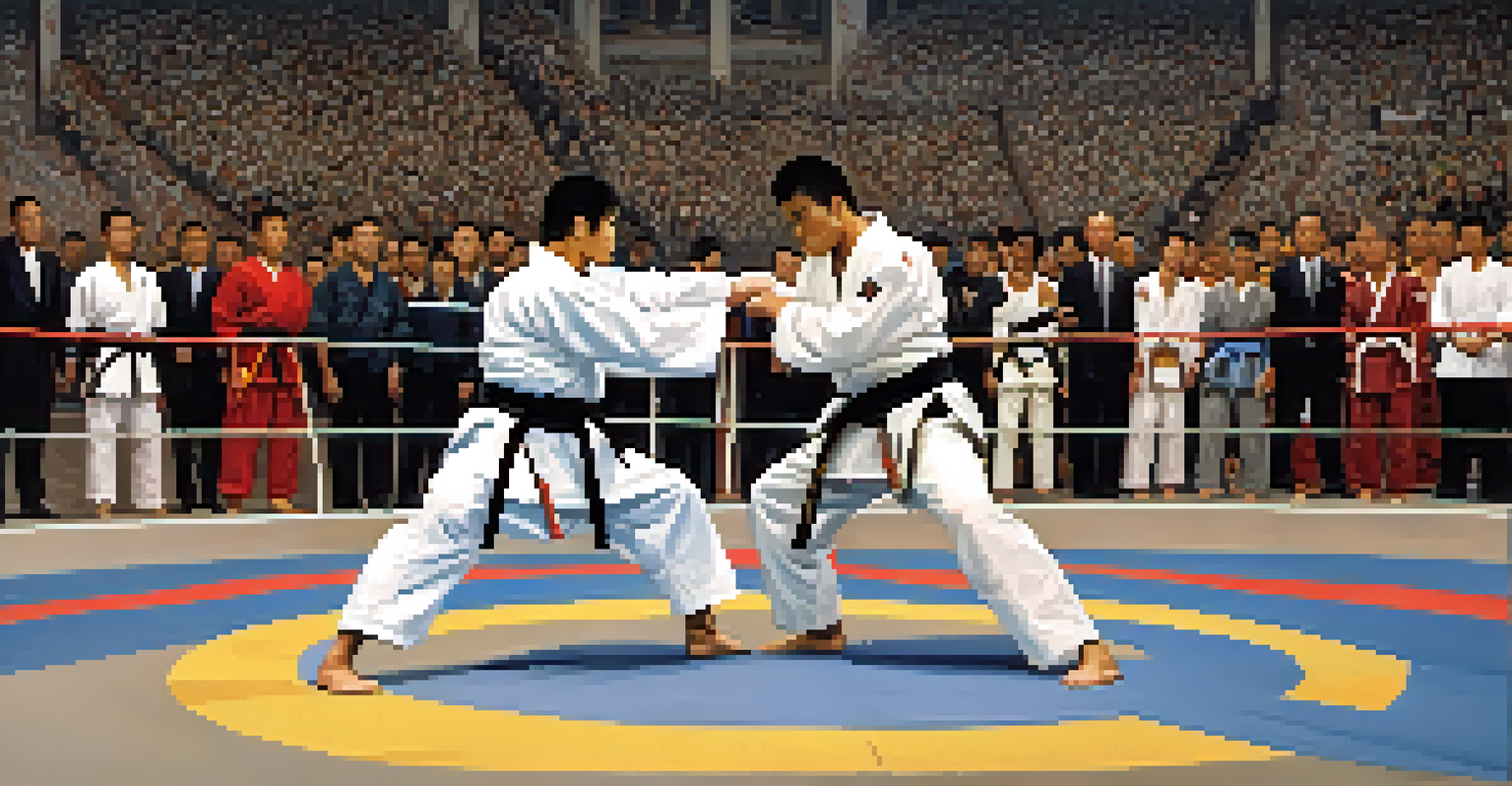The Role of Martial Arts in Promoting Respect and Unity

Understanding Martial Arts and Its Core Values
Martial arts is not just about physical combat; it's deeply rooted in philosophy and values. At its core, it emphasizes respect, discipline, and self-control, which are crucial elements in building a harmonious community. Practitioners learn to honor their instructors, fellow students, and even opponents, fostering an environment of mutual respect.
The ultimate aim of martial arts is not having to use them.
This foundation of respect creates a unique culture within martial arts schools. For instance, bowing to each other before and after sparring is a common practice that signifies acknowledgment and appreciation. Such rituals serve as constant reminders of the importance of treating others with dignity and kindness.
Furthermore, the values instilled through martial arts often extend beyond the dojo. Many practitioners find themselves applying these principles in their daily lives, contributing to a more respectful society. This ripple effect illustrates how martial arts can play a significant role in shaping positive behaviors within communities.
Building Unity Through Shared Goals and Challenges
Martial arts training is a journey that involves overcoming challenges together, which naturally fosters unity among practitioners. Whether it’s preparing for a belt test or competing in tournaments, students often find themselves working side by side, encouraging one another to push their limits. This shared experience helps build strong bonds that can last a lifetime.

Consider a scenario where a group of students trains for a competition. They not only work on their individual skills but also learn the importance of teamwork and support. Celebrating each other's successes, as well as comforting each other in defeats, creates a strong sense of camaraderie that transcends individual accomplishment.
Core Values Foster Community
Martial arts emphasizes respect, discipline, and self-control, creating a harmonious culture within schools and extending these values into everyday life.
Ultimately, these shared goals encourage a supportive atmosphere where everyone feels valued. This unity helps individuals understand that they are part of something bigger than themselves, reinforcing the idea that martial arts is about community and connection as much as it is about personal growth.
Diversity in Martial Arts and Its Influence on Respect
Martial arts is a melting pot of cultures, drawing practitioners from various backgrounds and traditions. This diversity enriches the training environment and allows students to learn from one another's unique perspectives. As students engage with different styles, they cultivate respect for various cultures and practices, promoting inclusivity.
Martial arts is not about the victory, but the respect and humility that comes from it.
For instance, a dojo that teaches Brazilian Jiu-Jitsu alongside traditional Karate creates an environment where students appreciate the nuances of each discipline. This interaction encourages open-mindedness and respect for different methods and philosophies, leading to a more harmonious learning environment.
Moreover, the exposure to diverse backgrounds fosters friendships that might not occur outside of the martial arts community. These connections serve as powerful reminders that despite our differences, we share common goals and values, further enhancing the sense of unity and respect among practitioners.
Conflict Resolution Skills Developed in Martial Arts
One of the lesser-known benefits of martial arts training is the development of conflict resolution skills. Practitioners are often taught to handle confrontations through calmness and technique rather than aggression. This emphasis on resolving conflicts peacefully translates into everyday life, equipping individuals with the tools to navigate disputes respectfully.
For example, students learn the importance of communication and understanding in preventing conflicts from escalating. They understand that the goal is not to defeat an opponent but to find a resolution that satisfies everyone involved. This mindset is vital in fostering respect not only within the dojo but also in personal and professional relationships.
Unity Through Shared Experiences
Training together in martial arts fosters strong bonds among practitioners, encouraging teamwork and support that enhances community spirit.
As students practice these skills, they become role models in their communities. By demonstrating how to handle disagreements with respect and dignity, martial artists contribute to a culture of peace and understanding, encouraging others to adopt similar approaches.
Mentorship and Leadership in Martial Arts
Martial arts places a strong emphasis on mentorship, where experienced practitioners guide newcomers. This relationship is built on mutual respect, as students learn to appreciate their mentors' wisdom and experience. In turn, mentors feel a sense of responsibility to instill values of respect and unity in their students.
For instance, a black belt may take a new student under their wing, not only teaching them techniques but also sharing life lessons learned through years of practice. This dynamic fosters a sense of belonging and community, as students feel supported in their journey.
Moreover, as students progress, they often become mentors themselves, perpetuating the cycle of respect and unity. This development of leadership within martial arts reinforces the idea that everyone has something valuable to contribute, creating a stronger and more cohesive community.
The Role of Competitions in Promoting Respect
Competitions in martial arts often serve as a unique platform for promoting respect among practitioners. While the competitive nature can bring out strong emotions, the values of respect and sportsmanship remain paramount. Competitors greet each other with respect, acknowledging their shared dedication to the art and the effort put into training.
After a match, it’s common to see opponents congratulating each other and sharing a moment of camaraderie. This acknowledgment highlights the understanding that, regardless of the outcome, each participant has worked hard and deserves respect for their efforts. Such interactions help reinforce the idea that competition is not just about winning but also about mutual respect.
Mentorship Builds Lasting Bonds
The mentorship dynamic in martial arts nurtures respect and unity, as experienced practitioners guide newcomers, perpetuating a cycle of support and leadership.
In this way, competitions become more than just events; they transform into opportunities for personal growth and community building. Participants learn valuable lessons about humility and honor, which they carry with them long after the competition ends, contributing to a culture of respect within the martial arts community.
Community Outreach and Martial Arts Programs
Many martial arts schools engage in community outreach programs, further extending the principles of respect and unity beyond their dojos. These initiatives often include self-defense workshops, anti-bullying seminars, or free classes for underserved communities. Such efforts demonstrate a commitment to sharing the values of martial arts with a broader audience.
For instance, a local dojo might host a self-defense class for women, empowering participants while fostering a sense of community. These programs not only teach valuable skills but also build connections among diverse groups of people, reinforcing the importance of respect and support.

Through these outreach efforts, martial arts schools play a crucial role in promoting positive change within their communities. By sharing their expertise and values, they help cultivate a culture of respect, unity, and empowerment that benefits everyone involved.